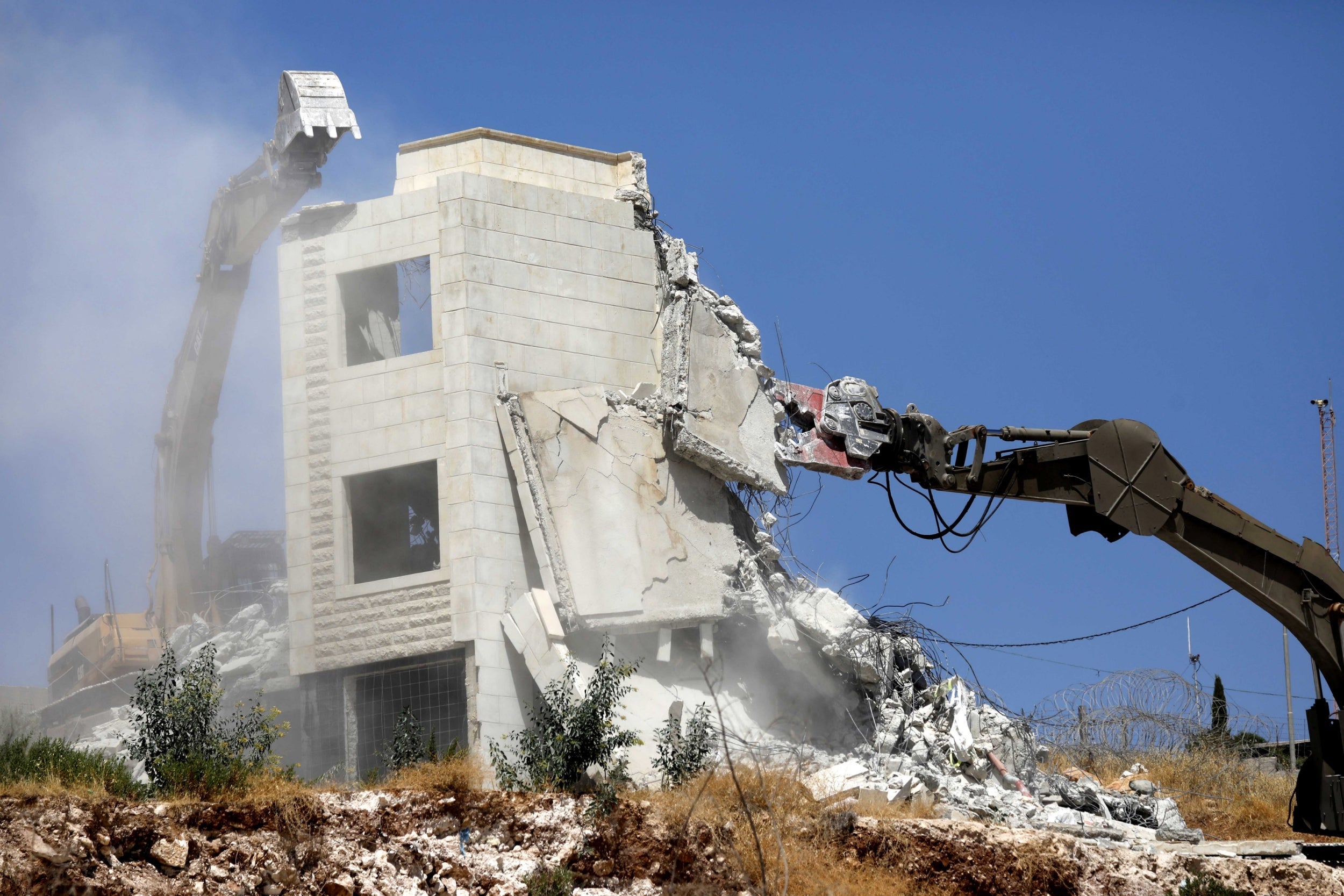Israel begins demolishing Palestinian homes in east Jerusalem
The destruction follows years of fights over their legality
Israel began demolishing dozens of Palestinian homes in east Jerusalem on Monday, in a large-scale operation that has drawn criticism from the international community.
Bulldozers accompanied by hundreds of police and soldiers moved to dismantle the homes in the Palestinian village of Sur Baher, which lies close to an Israeli-built separation wall that runs for hundreds of miles through the West Bank.
Security forces arrived at around 2 am, ordering families out of at least four of their homes, human rights workers told The Independent. Amer Arouri from Israeli rights monitor Btselem said so far those four buildings have been demolished leaving 25 people homeless, while work had begun on a seven-story uninhabited apartment block.
The Israeli government claims the proximity of the homes to the wall represents a security risk, and the buildings were built illegally, but critics argue the demolitions are part of a broader policy of forced displacement aimed at cementing Israel’s control of east Jerusalem.
The United Nations and the European Union have both criticised the move with the UN's humanitarian coordinator Jamie McGoldrick saying the demolitions were "not compatible" with international law and had "even greater significance, as many other homes and structures now risk the same fate".
Israel took control of the West Bank and east Jerusalem in the 1967 Arab-Israeli war, and Israel claims east Jerusalem is an indivisible part of its capital. The international community considers both areas to be occupied territory, and the Palestinians seek them as parts of a future independent state.
Sur Baher's location has placed it in the centre of these disputes. Parts of the village lie inside the municipal boundary of Israeli-occupied east Jerusalem and parts outside the barrier, in the West Bank. But some lies in between: just outside the Jerusalem line but still on the Israeli side of the barrier.
Palestinian owners say their buildings lay within areas run by the Palestinian Authority, which exercises limited self-rule in the Israeli-occupied West Bank, and maintain they had secured PA permits to build. But Israel’s Supreme Court rejected a final appeal from residents of Sur Baher this month, clearing the way for the demolitions.
“My kids, having just woke up, were terrified and thought it was a nightmare. I looked around and found many of my neighbours standing outside their homes as well. I saw 40 or 50 bulldozers and maybe a few hundred soldiers,” said Abo El-Saeed El-Kaswany, 40 who owned one of the four houses that have already been razed.
“I still have no idea where to go with my five kids. I’ve been making phone calls to find if someone would host me for a few weeks until I find a more stable solution.”
Btselem's Azouri who was also at the scene said the people were given permits from the PA to build as the area should mostly under full Palestinian control.
"However the Israeli security forces came at 2am and forced 25 people to leave their home. They beat some people and arrested others," he told The Independent.
"The families told me they will live in tents on the rubble of their homes, they are poor people and do not have the money to rent houses," he added.
Gilad Erdan, Israel's minister of public security, said the Supreme Court ruled the illegal construction "constitutes a severe security threat and can provide cover to suicide bombers and other terrorists hiding among civilian population."
Palestinian Prime Minister Mohammad Shtayyeh described the demolitions as a “grave aggression.”
"This is a continuation of the forced displacement of the people of Jerusalem from their homes and lands — a war crime and a crime against humanity," he said.
The European Union criticised the demolitions, saying in a statement that “the continuation of this policy undermines the viability of the two-state solution and the prospect for a lasting peace."

The UN's McGoldrick and other UN officials called on the Israeli authorities last week to halt the demolition plans. They said 17 Palestinians faced displacement from the plans to level 10 buildings, including dozens of apartments.
Mr McGoldrick said the UN was watching "with sadness" at events as they unfolded.
"No amount of humanitarian assistance can replace a home or cover the massive financial losses sustained today by the owners," he wrote adding some of the affected were refugees and so twice displaced.
"What happened today in Sur Bahir is of even greater significance, as many other homes and structures now risk the same fate... Israel’s policy of destroying Palestinian property is not compatible with its obligations under international humanitarian law."
With additional reporting by Mohammed Ezz
Join our commenting forum
Join thought-provoking conversations, follow other Independent readers and see their replies
Comments
Bookmark popover
Removed from bookmarks